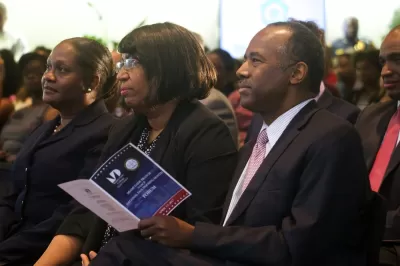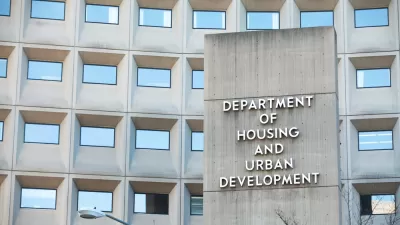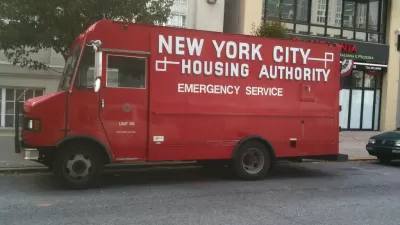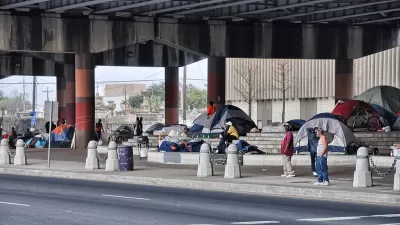Secretary Ben Carson's vision for the Department of Housing and Urban Development focuses on a new workforce development program called EnVision Centers.

Robert Abare interviews Urban Institute fellow Susan J. Popkin on the subject of EnVision Centers, the centerpiece of Secretary Ben Carson's agenda at the Department of Housing and Urban Development (HUD) as he tries to move the mission of HUD away from public housing and toward self-reliance.
Abare explains the EnVision Centers concept as follows: "Located on or near public housing developments, the centers are to be hubs where residents can access services intended to boost self-sufficiency among assisted people through four pillars: character and leadership, educational advancement, economic empowerment, and health and wellness."
As has been noted in previous coverage of Secretary Carson's frustrations in his role at HUD, EnVision Centers have not been devoted much priority. The Trump Administration's most recent budget request, while likely to be mostly ignored by Congress like most presidential budget requests, only includes $2 million for the EnVision Centers. Still, give the importance of the concept to Secretary Carson's agenda, Abare questions Popkin about the precedents, potential, and shortcomings of the idea.
Popkin makes it clear at the outset of the interview that EnVision Centers are based on familiar ideas, and that previous workforce programs have produced modest effects. When asked what is standing in the way of self-sufficiency for the residents of public housing in locations around the United States, Popkin answered thusly:
HUD should be wary of implying that people in public housing don’t want to work—they do. When I’ve visited public housing properties and asked residents what they need, they say jobs.
But low-income people also say that they need various supports to be able to work. They need child care, a wage that can support a decent quality of life, a system that doesn’t put a 100 percent tax on benefits like TANF [Temporary Assistance for Needy Families], SNAP [the Supplemental Nutrition Assistance Program], and housing assistance when they start earning more, and reliable and affordable transportation options.
FULL STORY: Ben Carson’s plan for “EnVision Centers” looks familiar and needs realistic expectations

Alabama: Trump Terminates Settlements for Black Communities Harmed By Raw Sewage
Trump deemed the landmark civil rights agreement “illegal DEI and environmental justice policy.”

Study: Maui’s Plan to Convert Vacation Rentals to Long-Term Housing Could Cause Nearly $1 Billion Economic Loss
The plan would reduce visitor accommodation by 25% resulting in 1,900 jobs lost.

Planetizen Federal Action Tracker
A weekly monitor of how Trump’s orders and actions are impacting planners and planning in America.

Waymo Gets Permission to Map SF’s Market Street
If allowed to operate on the traffic-restricted street, Waymo’s autonomous taxis would have a leg up over ride-hailing competitors — and counter the city’s efforts to grow bike and pedestrian on the thoroughfare.

Parklet Symposium Highlights the Success of Shared Spaces
Parklets got a boost during the Covid-19 pandemic, when the concept was translated to outdoor dining programs that offered restaurants a lifeline during the shutdown.

Federal Homelessness Agency Places Entire Staff on Leave
The U.S. Interagency Council on Homelessness is the only federal agency dedicated to preventing and ending homelessness.
Urban Design for Planners 1: Software Tools
This six-course series explores essential urban design concepts using open source software and equips planners with the tools they need to participate fully in the urban design process.
Planning for Universal Design
Learn the tools for implementing Universal Design in planning regulations.
Caltrans
Smith Gee Studio
Institute for Housing and Urban Development Studies (IHS)
City of Grandview
Harvard GSD Executive Education
Toledo-Lucas County Plan Commissions
Salt Lake City
NYU Wagner Graduate School of Public Service





























